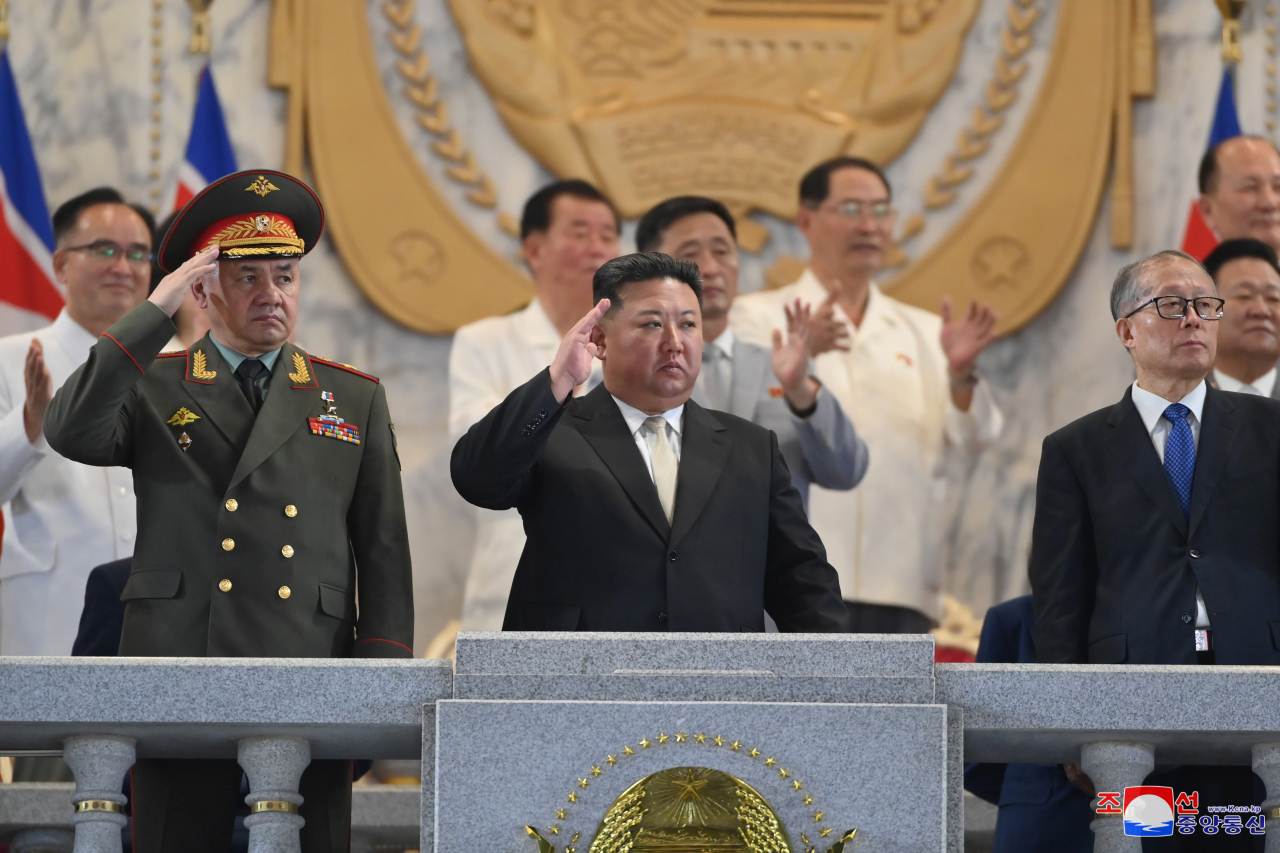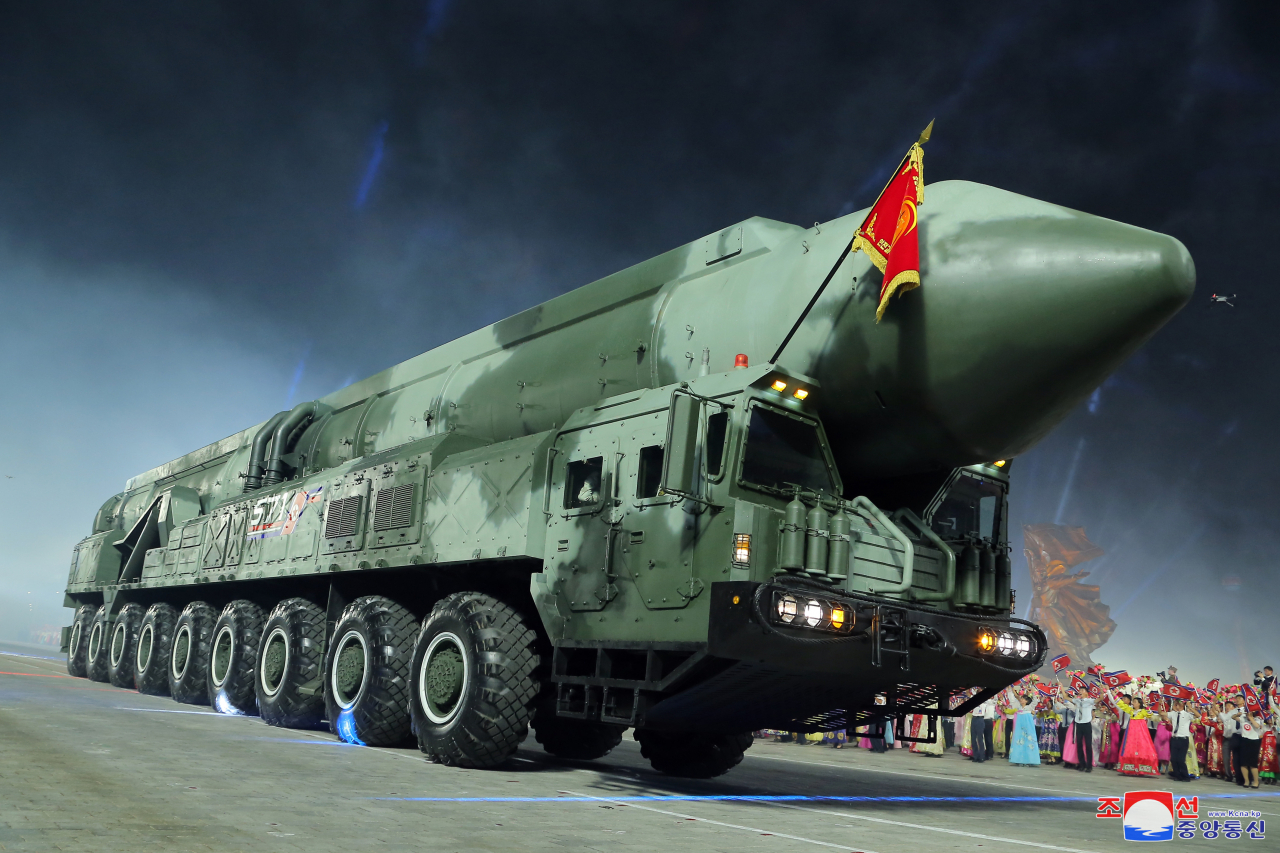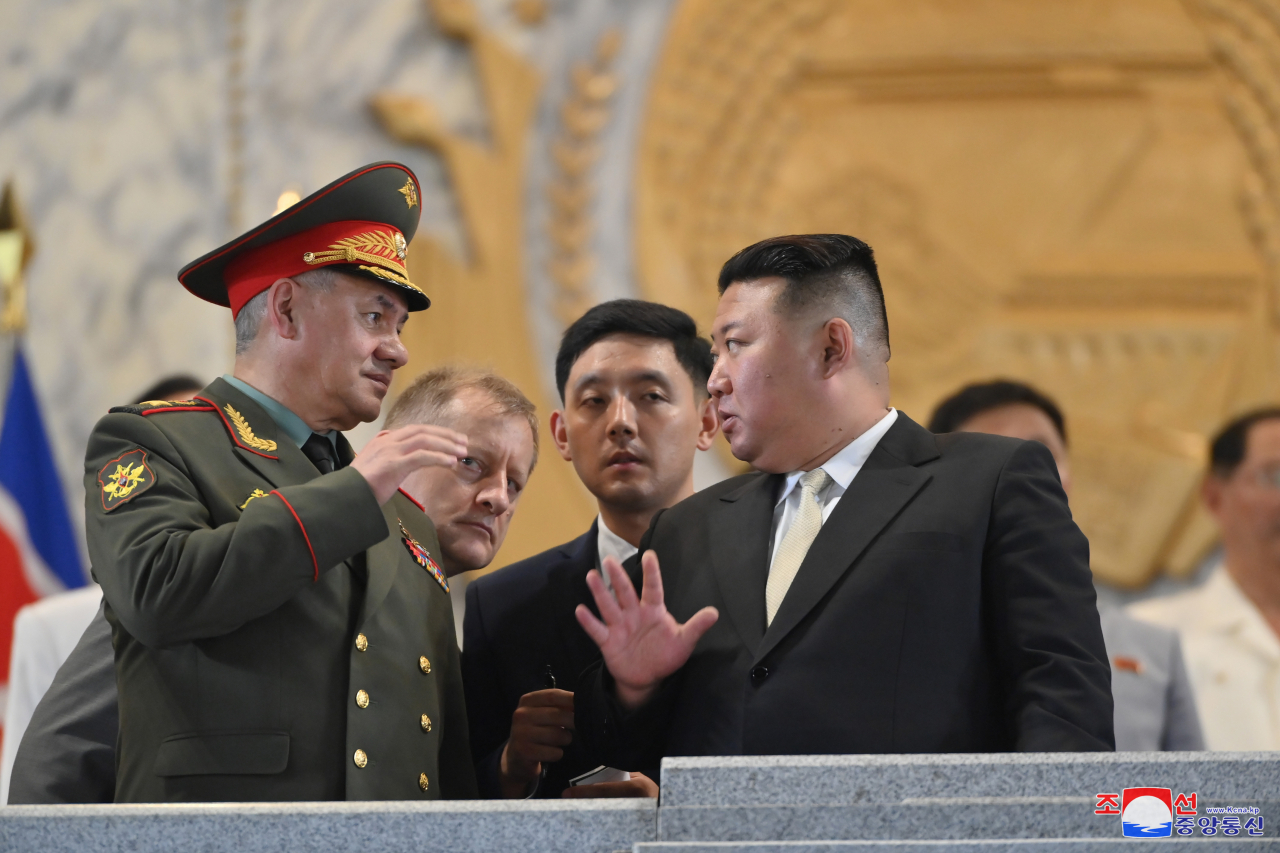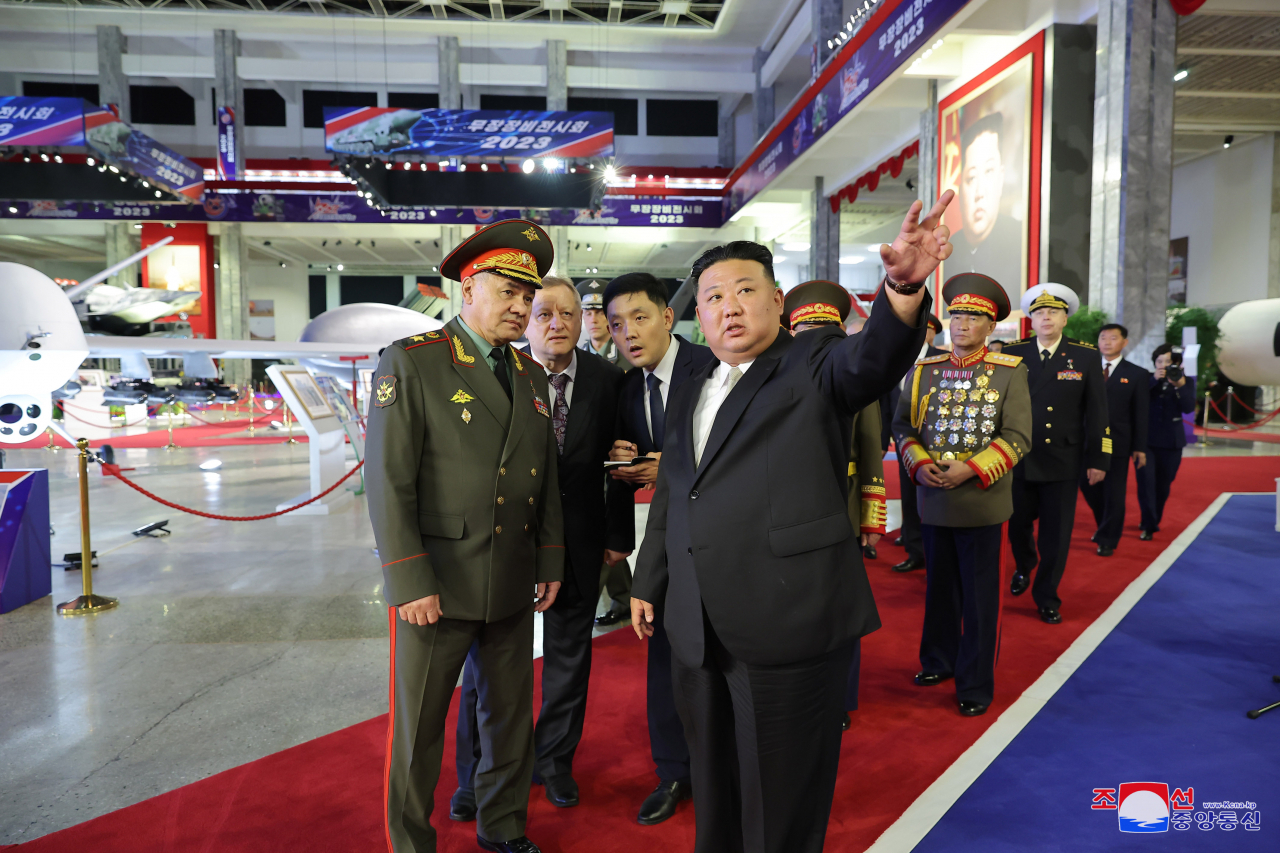 |
North Korean leader Kim Jong-un (center), alongside Russian Defense Minister Sergei Shoigu (left) and Chinese Communist Party politburo member Li Hongzhong (right), observes a military parade at Kim Il-sung Square in Pyongyang on Thursday, to mark the 70th anniversary of the signing of the armistice that halted the 1950-53 Korean War, in this photo released the next day by North Korea's official Korean Central News Agency. (Yonhap) |
North Korea issued an explicit and firm warning that any use of nuclear weapons by the United States would result in the country's destruction. The warning was made during a military parade held on the anniversary of the signing of the Korean War armistice and was attended by high-level delegations from China and Russia.
North Korean leader Kim Jong-un attended the highly choreographed military parade in Pyongyang to celebrate July 27, which is labeled by the country as the "Day of Victory in the Great Fatherland Liberation War." Thursday marked the 70th anniversary of the armistice agreement of the 1950-53 Korean War that began with North Korea's invasion of South Korea.
North Korea's Defense Minister Kang Sun-nam delivered a speech targeting South Korea and the United States during the parade, which showcased North Korea's weapons and armed forces, including nuclear-capable Hwasong-17 and Hwasong-18 intercontinental ballistic missiles designed to target the US mainland.
"The US imperialists have no room for survival in the case they use nuclear weapons against the DPRK," Kang said, referring to North Korea by the acronym of its official name, the Democratic People's Republic of Korea.
Kang strongly denounced South Korea and the US for enhancing their deterrence and readiness posture in the face of escalating missile and nuclear threats, seeking to use the allies' move as a pretext to continue its military and nuclear buildup.
"We solemnly declare that if they attempt military confrontation ... the exercise of our state's armed forces will go beyond the scope of the right of defense for the United States of America and the 'ROK,'" Kang warned. The ROK stands for the Republic of Korea, South Korea's official name.
 |
A Hwasong-18 solid-fuel intercontinental ballistic missile (ICBM) is displayed during a military parade, attended by North Korean leader Kim Jong-un, at Kim Il-sung Square in Pyongyang on Thursday night, to mark the 70th anniversary of the signing of the armistice that halted the 1950-53 Korean War, in this photo released the next day by North Korea's official Korean Central News Agency. (Yonhap) |
Kim did not deliver any public speech during the military parade.
But Kim's presence at the military parade, alongside high-ranking Chinese and Russian officials, carries a significant message that goes beyond a mere speech or the display of newly developed weapons.
Kim was seen standing between Russian Defense Minister Sergei Shoigu and Politburo member Li Hongzhong during the military parade, which displayed ICBMs and dual-capable short-range missiles capable of carrying tactical nuclear weapons that respectively target the US and South Korea.
In particular, Kim and Shoigu's act of saluting the Hwasong-18 solid-fuel ICBM during the military parade sent a potent message of strength and unity between North Korea and Russia in the face of growing external pressures and sanctions.
This scene symbolically demonstrates China and Russia firmly supporting North Korea, which is becoming increasingly isolated in the international community due to its illicit nuclear and missile development.
China and Russia, being two of the five veto-wielding permanent members of the UN Security Council, have consistently opposed taking collective actions against North Korea's ongoing ballistic missile launches, which are in clear violation of multiple UNSC resolutions. Their stance on not supporting more stringent measures against North Korea has remained hurdles for a unified international response to address the issue.
 |
North Korean leader Kim Jong-un (right) talks with Russian Defense Minister Sergei Shoigu as he attends a military parade at Kim Il-sung Square in Pyongyang on Thursday night to mark the 70th anniversary of the signing of the armistice that halted the 1950-53 Korean War, in this photo released the next day by North Korea's official Korean Central News Agency. (Yonhap) |
Meanwhile, South Korea's Unification Ministry on Friday said North Korea was "focused on conveying external messages, highlighting their solidarity with China and Russia" on the occasion of the July 27 anniversary.
North Korea aimed to "demonstrate the alignment of interests among North Korea, China, and Russia, in response to strengthened security cooperation between South Korea, the United States, and Japan," the ministry added.
But the Unification Ministry also noted that "North Korea displayed a more pronounced desire to strengthen its closer cooperation with Russia rather than China" especially amid Russia's ongoing armed invasion of Ukraine.
"In this year's events, North Korea showcased its increased military cooperation with Russia, raising concerns within the international community, by extending its invitation to the Russian military delegation led by the defense minister."
The ministry observed a significant disparity in media coverage and public interaction between Kim and the delegations from China and Russia.
The media coverage appeared to be more focused on the Russian delegation, and there were evident differences in the level of public engagement and interaction between Kim and the two delegations.
The sequencing of events during the military parade showed that the Russian delegation was introduced first. Kim also participated in four separate events with the Russian defense minister on Wednesday and Thursday.
 |
North Korean leader Kim Jong-un (right), alongside Russian Defense Minister Sergei Shoigu (left) visits a weaponry exhibition in Pyongyang on Wendesayto celebrate the 70th anniversary the next day of the armistice that halted the 1950-53 Korean War, in this photo released by North Korea's official Korean Central News Agency. (Yonhap) |
The extensive participation of the Russian delegation in almost all events commemorating the "Day of Victory" alongside Kim Jong-un during their visit to Pyongyang garnered significant attention.
Kim and Shoigu held a bilateral meeting, attended North Korea's weapons exhibition, and watched a commemorative performance on Wednesday.
The presence of Shoigu at the weapons exhibition drew criticism from South Korea and the US due to concerns that North Korea has been illegally providing weapons to Russia amid the ongoing conflict with Ukraine since February 2022. Such arms trade would be a clear violation of UN Security Council resolutions.
On Thursday, Kim and Shoigu continued their engagements with each other. They had another round of talks, followed by a luncheon and dinner together. In addition, they participated in an indoor mass meeting and an outdoor military parade.
During the mass indoor meeting, Russian Defense Minister Shoigu made a conspicuous move by reading a letter on behalf of Russian President Vladimir Putin. It is highly unusual for a foreign delegate to deliver a speech at a mass meeting in North Korea, drawing attention to this noteworthy event.
In the letter, President Putin emphasized the significance of cherishing and strengthening the "proud tradition of friendship, good neighborliness, and mutual assistance in the face of present-day threats and challenges."
"The Democratic People's Republic of Korea's firm support to the special military operation against Ukraine and its solidarity with Russia on key international issues highlight our common interests and determination to counter the policy of the Western group," Putin was quoted by North Korean state media as saying in the letter.
During their second meeting on Thursday, Kim Jong-un and Russian Defense Minister Shoigu also engaged in detailed and candid discussions regarding "important issues of mutual concern." The discussion covered topics such as the rapidly evolving international security environment and the military and political situation on the Korean peninsula.
"The talk also sincerely discussed some issues arising in further developing the strategic and tactical collaboration and cooperation between the two countries in the field of defense and security," state media reported Friday in an English-language dispatch.
During the dinner reception on Thursday, Ri Pyong-chol, the vice chairman of the Central Military Commission of the ruling Workers' Party, made a statement emphasizing the significance of the Russian delegation's visit on the occasion of the 70th anniversary of July 27.
Ri said the visit "served as an occasion for powerfully demonstrating the might of unity and solidarity between the two countries which had been sealed at the cost of blood."







![[Weekender] Korea's traditional sauce culture gains global recognition](http://res.heraldm.com/phpwas/restmb_idxmake.php?idx=644&simg=/content/image/2024/11/21/20241121050153_0.jpg)